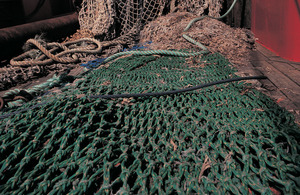UK spearheads significant step forward in EU fish negotiations
Member States have today agreed a package of reforms to implement a discards ban, make fishing more sustainable and give countries the ability to make decisions regionally.

Fishing nets
New laws that will radically reform the broken Common Fisheries Policy are now imminent after the UK secured a crucial agreement with EU Fisheries Ministers. Today Member States have agreed a package of reforms to implement a discards ban, make fishing more sustainable and give countries the ability to make decisions regionally.
Following difficult and lengthy negotiations in Brussels, EU Fisheries Ministers have agreed their position so that a final deal can now be made with the European Parliament. Specifically the Council decided on:
- detailed measures to ban the discarding of fish;
- legally binding limits to ensure fishing levels are sustainable;
- provisions to decentralise decision making, allowing Member States to agree the measures appropriate to their fisheries.
Leading the negotiations for the UK, Fisheries Minister Richard Benyon said:
I came here to secure an agreement that would be good for the UK and to head off those who sought to water down the changes we desperately need to make to this broken policy. I am delighted that we have been able to do that today.
This was a difficult negotiation, and although it is not as ambitious as I would have liked, we have stuck to our key principles.
This package of reforms fulfils our promise to make discards a thing of the past and ensure sustainable fishing for future generations.
Negotiations have been ongoing for over three years, during which time the Government has pressed hard for a radical overhaul of the currently broken system.
The Government has fought for a commitment to firm dates to ban discards and this agreement, once finalised by the European Parliament, will see a ban introduced on 1 January 2015 for ‘Pelagic’ fisheries (such as Mackerel and Herring). A ban will also be put in place for other fisheries starting on 1 January 2016.
The changes will also allow countries to work together regionally to implement measures appropriate to their own fisheries, rather than be subject to ineffective micro-management from Brussels. This ‘regionalisation’ process has been a top negotiating priority for the UK Government which has built support for reforms to replace the over-centralised system that currently hinders progress in our fisheries.
Furthermore, the Council has agreed legally binding limits to ensure sustainable fishing. This will ensure annual quotas will be underpinned by scientific advice, to achieve healthy fish stocks and a prosperous fishing industry.
Richard Benyon added:
The next step is for the European Parliament to agree these reforms which are set to bring about real benefits for our fishermen and the marine environment for years to come. We have worked hard on these negotiations, and I hope that Parliament supports our agreement and brings negotiations to a swift conclusion. The wait is nearly over
Discussions between the European Parliament, Commission and Council will now continue to finalise the new Common Fisheries Policy, and it is hoped that the new legislation will come into force before 1 January 2014.